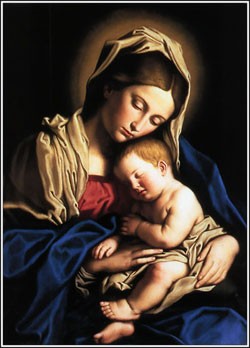Feast Day – 1 January
 The Mother of God, Mother of Jesus, wife of St. Joseph, and the greatest of all Christian saints. The Virgin Mother “was, after her Son, exalted by divine grace above all angels and men”.
The Mother of God, Mother of Jesus, wife of St. Joseph, and the greatest of all Christian saints. The Virgin Mother “was, after her Son, exalted by divine grace above all angels and men”.
Mary is venerated with a special cult, called by St. Thomas Aquinas, hyperdulia, as the highest of God’s creatures. The principal events of her life are celebrated as liturgical feasts of the universal Church. Mary’s life and role in the history of salvation is prefigured in the Old Testament, while the events of her life are recorded in the New Testament.
Traditionally, she was declared the daughter of Sts. Joachim and Anne. Born in Jerusalem, while living in Nazareth, Mary was visited by the archangel Gabriel, who announced to her that she would become the Mother of Jesus, by the Holy Spirit. She became betrothed to St. Joseph and went to visit her cousin, Elizabeth, who was bearing St. John the Baptist. Acknowledged by Elizabeth as the Mother of God, Mary intoned the Magnificat.
When Emperor Augustus declared a census throughout the vast Roman Empire, Mary and St. Joseph went to Bethlehem, his city of lineage, as he belonged to the House of David. There Mary gave birth to Jesus and was visited by the Three Kings. Warned to flee, St. Joseph and Mary went to Egypt to escape the wrath of King Herod. They remained in Egypt until King Herod died and then returned to Nazareth.
Nothing is known of Mary’s life during the next years except for a visit to the Temple of Jerusalem, at which time Mary and Joseph sought the young Jesus, who was in the Temple with the learned elders.
Mary was present at the Crucifixion in Jerusalem and there she was given into John’s care. She was also with the disciples in the days before the Pentecost, and it is believed that she was present at the Resurrection and Ascension. No scriptural reference concerns Mary’s last years on earth. According to tradition, she went to Ephesus, where she experienced her “dormition.” Another tradition states that she remained in Jerusalem.
The belief that Mary’s body was assumed into heaven is one of the oldest traditions of the Catholic Church. Pope Pius XII declared this belief Catholic dogma in 1950. The feast of the Assumption is celebrated on August 15.
The dogma of the Immaculate Conception – that Mary, as the Mother of the Second Person of the Holy Trinity, was free of original sin at the moment of her conception was proclaimed by Pope Pius IX in 1854 . The feast of the Immaculate Conception is celebrated on December 8. Pope Pius XII dedicated the entire human race to Mary in 1944.
The Church has long taught that Mary is truly the Mother of God. St. Paul observed that “God sent His Son, born of a woman,” expressing the union of the human and the divine in Christ. As Christ possesses two natures, human and divine, Mary was the Mother of God in his human nature. This special role of Mary in salvation history is clearly depicted in the Gospel in which she is seen constantly at her son’s side during his soteriological mission. Because of this role exemplified by her acceptance of Christ into her womb, her offering of him to God at the Temple, her urging him to perform his first miracle, and her standing at the foot of the Cross at Calvary Mary was joined fully in the sacrifice by Christ of himself. Pope Benedict XV wrote in 1918: “To such an extent did Mary suffer and almost die with her suffering and dying Son; to such extent did she surrender her maternal rights over her Son for man’s salvation, and immolated him – insofar as she could in order to appease the justice of God, that we might rightly say she redeemed the human race together with Christ” . Mary is entitled to the title of Queen because, as Pope Pius XII expressed it in a 1946 radio speech, “Jesus is King throughout all eternity by nature and by right of conquest: through him, with him, and subordinate to him, Mary is Queen by grace, by divine relationship, by right of conquest, and by singular election.”
Mary possesses a unique relationship with all three Persons of the Trinity, thereby giving her a claim to the title of Queenship. She was chosen by God the Father to be the Mother of his Son; God the Holy Spirit chose her to be his virginal spouse for the Incarnation of the Son; and God the Son chose her to be his mother, the means of incarnating into the world for the purposes of the redemption of humanity. While she is not our Mother in the physical sense, she is called a spiritual mother, for she conceives, gives birth, and nurtures the spiritual lives of grace for each person.